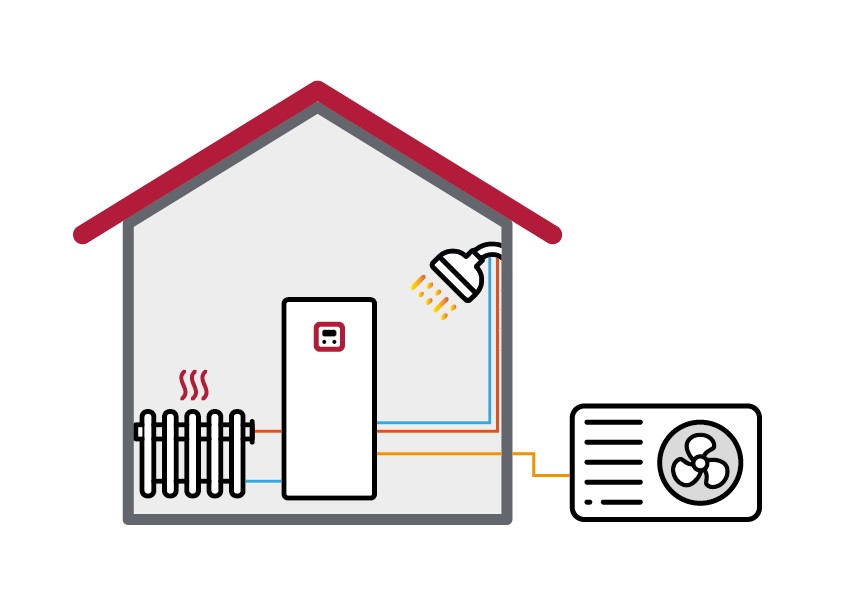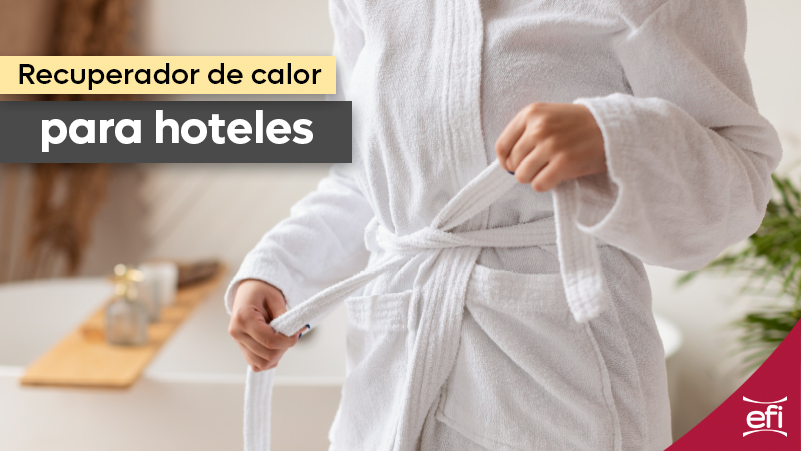10 Essential Heat Pump Answers

Author: Araceli Buendía
Efitherma marketing department
10 Essential Heat Pump Answers

Author: Araceli Buendía
Efitherma marketing department
We answer ten questions that resolve your doubts about the heat pump
If you are considering installing a heat pump in your home or business, you probably have many questions in mind. Don’t worry, you are in the right place. In this article, we will address the 10 most common questions that usually arise around this air conditioning and domestic hot water system.
From energy efficiency to maintenance, compatibility with existing systems and environmental benefits, we’ll discuss everything you need to know to make an informed decision.
Are you ready to enter the world of heat pumps and discover how they can improve your quality of life and save energy? Let’s solve all your doubts!
1. What is the difference between an air-to-air heat pump and an air-to-water heat pump?
The air-air heat pump extracts energy from the outside air to transport it to the air in the room that you want to air condition.
For its part, the air-water heat pump carries out a similar process of absorbing energy from the air, only it transfers it to the water circuit. The energy goes from there to the terminals to be air-conditioned: radiators, underfloor heating, fan coils, among others. If it is going to be used to produce Domestic Hot Water, the energy would go to the exchanger.

AIR-WATER
Heat pump with outdoor unit

AIR-WATER
Compact heat pump

AIR-AIR
Heat pump with outdoor unit
2. How much space is required to install a heat pump?
The space required to install a heat pump can vary depending on the type of heat pump and the manufacturer. At Efitherma we manufacture heat pumps designed to be installed anywhere in your home. Our compact models are designed to take up less space and be ideal in small spaces. These are installed inside the home or building.
That said, the specific dimensions of a heat pump can vary, but thanks to the rectangular design of our units, it can fit in any area.
3. How much noise does the heat pump produce during operation?
The noise level produced by a heat pump during operation can vary depending on the model, manufacturer and installation conditions. However, in general, today’s heat pumps tend to be very quiet.
Noise is measured in decibels (dB). At Efitherma the noise levels of our equipment do not exceed 30 dB.

4. Does the heat pump require regular maintenance?
The maintenance of heat pumps is not difficult or expensive, as is often thought due to lack of knowledge. According to AFEC (Asociación de Fabricantes de Equipos de Climatización), residential heat pump systems require minimal and simple maintenance:
For the rest, it is only advisable to observe if there are relevant deteriorations, strange noises or malfunctions. In these cases, we must go to an approved technical service to repair the heat pump.
5. What is the average useful life of a heat pump?
The average lifespan of a heat pump can vary depending on several factors. These factors depend on the type of heat pump, quality of installation, proper maintenance, and operating conditions. But in general, heat pumps are very long-lasting equipment.
Compared to traditional systems such as gas boilers or air conditioning systems, heat pumps have a similar lifespan. However, heat pumps typically require less maintenance. They have superior energy efficiency, which can help extend their life and reduce operating costs over time.
6. What is the approximate installation cost of an aerothermal heat pump compared to other systems?
The cost of a heat pump compared to a traditional system can be somewhat higher due to its high efficiency and sustainability. However, you can amortize the installation over an interval of between 5 and 10 years and there is always the possibility of financing the installation.
If you only want hot water because you do not need heating, you can install aerothermal for DHW. This option is much better than a traditional gas or electric water heater. Our aerothermal equipment has much lower consumption and after a few years you will have paid for it. With respect to gas water heaters, the heat pump provides more security and comfort, since it supplies us with DHW without waiting and without the need to replace the gas cylinder.
Aerothermal heat pumps are very common in coastal areas. Its use is common in the Spanish Levant, Barcelona or Andalusia where temperatures are warm and mild and not much heating is required.
7. Are there subsidies available for the purchase of a heat pump?
Yes, subsidies, incentives and aid programs are regularly activated in many countries. These are intended to promote the acquisition of more efficient heating systems, such as heat pumps. Grants can vary by country, region, and even state or province.
In Europe there are already various associations specialized in the energy transition. These are responsible for promoting and managing public funds so that this technology reaches each European home in a more affordable way.
8. Will I need to carry out works or modifications to install a heat pump?
In the case of the compact heat pump, it does not require modifications or works compared to other types of heat pumps with indoor and outdoor units.
As a general rule, a compact heat pump is installed inside the home or building. This means that no significant modifications to the structure or façade of the building will be needed. However, it is important to take into account some aspects:
In general, compact heat pumps are designed for ease of installation. Committing to its use reduces the need for significant works or modifications. However, it is always advisable to consult with a professional or certified installer to evaluate your specific needs and determine if modifications or adaptations are required in your particular case.
9. Can the heat pump be used as the main heating or domestic hot water system in my home or business?
The answers is YES. A heat pump for heating, domestic hot water or both functionalities at the same time can be used as the main system in your home or business.
The ability of the heat pump to function as a main heating system or as a DHW source will depend on its design and characteristics. At Efitherma we manufacture equipment for Domestic Hot Water from 75 to 500 Liters. It is also possible to serialize and cover up to 1,000 liters per day.
Get more information here: https://efitherma.com/es/contact/
10. Is a hybrid solution profitable to obtain the highest possible efficiency?
A hybrid solution that integrates photovoltaic solar panels and a heat pump is an excellent option to improve the profitability and efficiency of your home. Here we explain why:
Energy saving
Reduce your dependence on the conventional electrical grid. Use solar energy to power your heat pump and generate electricity.
Costs reduction
By generating your own electricity you will see a significant decrease in your electricity bills. Additionally, the heat pump uses less energy.
Sustainability
You contribute to the reduction of greenhouse gas emissions and care for the environment.
More control
You can monitor the performance of your solar panels and adjust the temperature of your heat pump to maximize efficiency and energy savings.
Conclusions
- Lower energy consumption than other conventional systems.
- Versatility: They can work for domestic hot water, heating and cooling.
- More comfort. The heat pump is capable of maintaining a constant temperature.
- Less noise: Heat pumps are usually quieter compared to other systems.
- Subsidies: In many regions, there are government incentives for installation.
- More energy efficiency and sustainability.
Share
More articles
Do you know Efitherma?
Do you know Efitherma?
14900, Lucena
Córdoba (España)
957 591 684
Newsletter
Suscríbase a nuestro boletín de correo electrónico para obtener consejos útiles y todas las novedades
Enlaces útiles
Descubre Efitherma
Contacto
Redes sociales
Suscríbase a nuestro boletín de correo electrónico para obtener consejos útiles y todas las novedades






